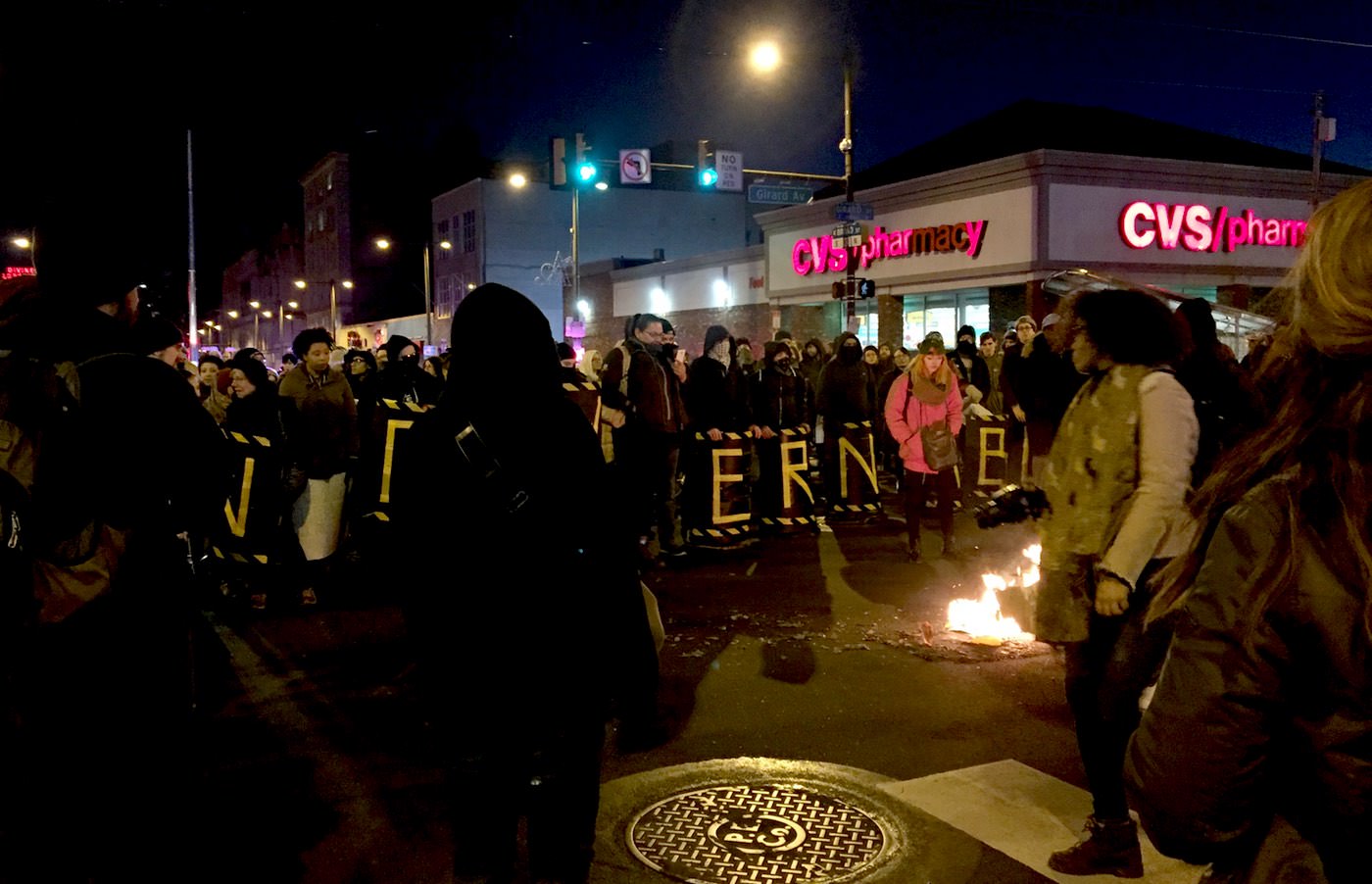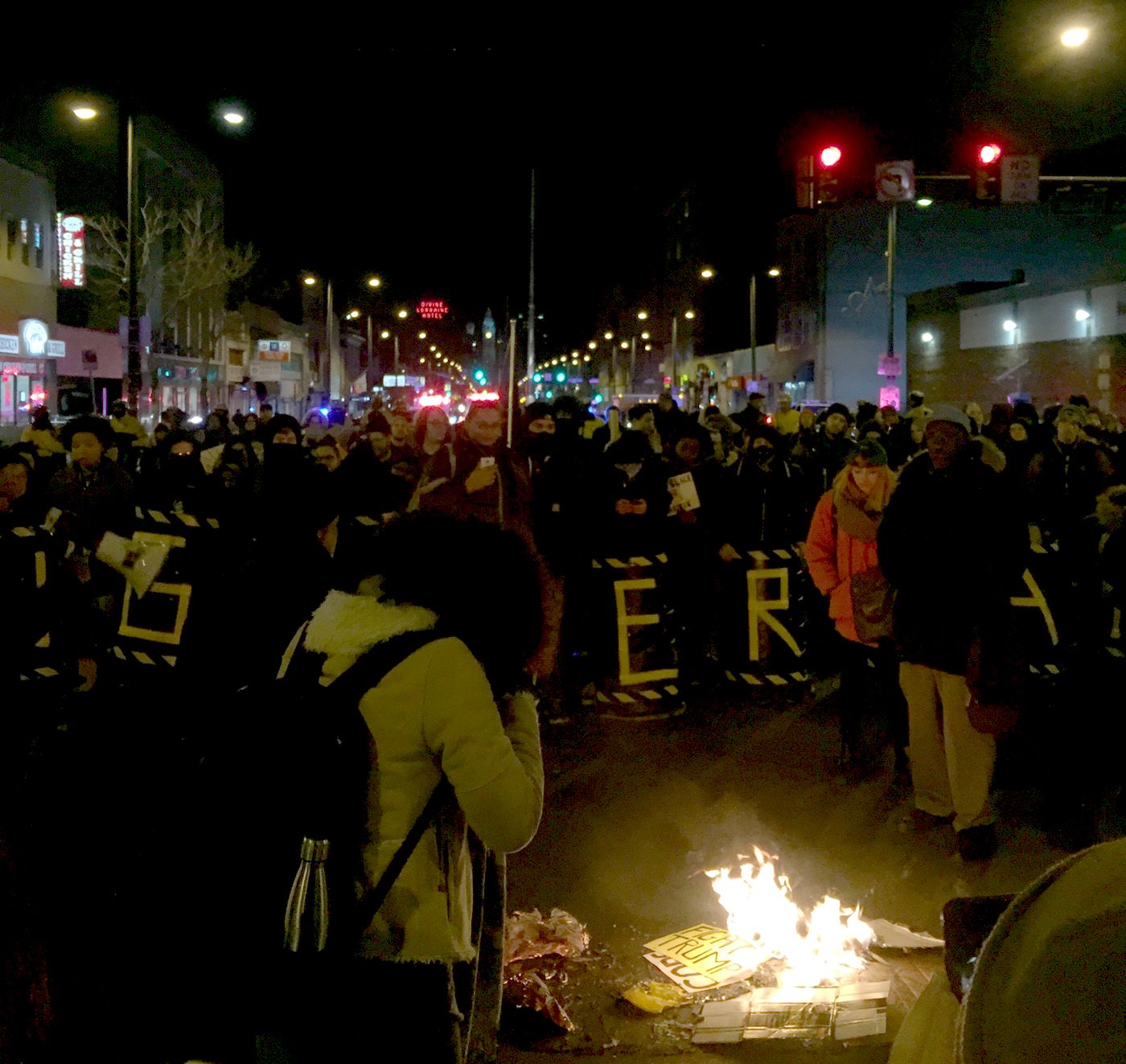
Donald Trump has taken to his soapbox to carp about “fake news,” as if the corporate news media were a subversive force. On the contrary, while biased or outright dishonest reporting is the rule rather than the exception, it almost always serves those in power. The interests of the corporate news media cannot be disentangled from the advertisers who fund them and the authorities they count on for scoops. In this eyewitness report from a demonstration in Philadelphia last Friday, participants relate how police attacked them with batons and pepper spray, then persuaded local media to report that it was the demonstrators who pepper-sprayed them.

Last night in North Philadelphia, four people were arrested and many were injured by batons and mace during a march organized by a local militant Black Lives Matter group, Philly Coalition for REAL Justice. The flier described it as a “Black Resistance March.” The online description expanded on this:
“All are welcome as long as they make space for black people at the front of the march. The issues contained in the assaults on LGBT folks, on Muslims and refugees, occupation and militarization abroad are intersectional. Today we center our black women, our black immigrants, black LGBTQ family, and our black Muslims. Dress warm and be vigilant.”
The march kicked off with a line of Bodyhammer-style shields made from large city traffic cones. Each one had a letter painted on it so that together they read “U-N-G-O-V-E-R-N-A-B-L-E.” Even the protest chants had an air of militancy. “Bullets Trump Hate” resonated throughout the streets as the march headed north on Broad Street. One person with a megaphone paid homage to the words that became a rallying cry after police officers murdered Eric Garner. “They say ‘hands up, don’t shoot,’ but we have another one for you… ‘guns up, shoot back.’”

The march made its way north towards the Temple campus. We stopped at the bustling intersection of Broad and Girard, a main artery for traffic and public transit. The crowd blocked the streets and burned American flags while people of color talked about police repression and terrorism through a megaphone. “This is not my flag. It has never been my flag. We’re burning this flag for Emmit Till. Trayvon Martin. Michael Brown. Freddie Gray. This is for Brandon Tate Brown.” There was more talk about the current racist stop-and-frisk policy, and, of course, the MOVE bombing of May 13, 1985. The list went on while the fire grew.

After it began to burn out, the march started to move again. The group wasn’t half as large as some anti-Trump demonstrations that brought out thousands only a few weeks ago. In a fashion typical of Philadelphia Police, the march was followed by dozens of squad cars and at least two police helicopters, and surrounded on either side by bike cops who seemed to outnumber participants by at least two to one. The strategy for policing mass mobilizations in Philadelphia is heavily influenced by former Police Commissioner Charles Ramsey; usually, the police avoid making arrests, while oversaturating the area with officers. This approach is informed by the “Vancouver Model” as outlined in the police manual Managing Major Events: Best Practices from the Field by the Police Executive Research Forum.
As soon as we neared Temple University, the march became confrontational. Those with megaphones tried to rush into the campus dining hall. Uniformed officers tripped over each other as they hurried to block the entrance and exits, using their bikes to shove people who stood in their way. They formed a line in front of the doors with their bikes as blockades.

Someone noticed a Bank of America across the street and everyone rushed in that direction. Only one officer stood guard before all the shielded protestors formed their own line at the entrance. Bike cops rushed over, clumsily tripping over each other again as they scrambled to catch up with the crowd. A scuffle broke out. Someone threw black paint over the bank window and perhaps an officer or two. Cops extended their batons. Shielded protesters stood their ground and moved forward, chanting “Kill the Rich.” Police pepper-sprayed a large portion of the crowd, then began swinging their batons and hitting many people. Four arrests took place. There was an unsuccessful attempt to de-arrest someone. I saw at least one person bleeding from the head after being hit by police. Street medics took care to help flush the pepper spray out of the eyes of those struck.

All the local news media outlets that covered this event reported that protestors pepper-sprayed the police and that police were hospitalized with injuries. No one I spoke with has witnessed anything other than the police pepper-spraying protestors. One person’s account is as follows: “Here’s what happened. We wanted to get inside Bank of America. A bunch of cops started beating people up with bikes and batons because they care more about capitalist institutions than people. One of them started spraying us with pepper spray. I got it in my eyes. The cops started shouting to their own guy, “Who’s spraying? Stop spraying!” Now, in order to cover up their incompetence, the press is implying that we were the ones who injured them.”
Eight more people were arrested outside the precinct the next day while doing jail support. It took over 24 hours before everyone was released. The Up Against the Law Legal Collective worked nonstop to find out where everyone was being held and when they would be eligible for bail, while the local Food Not Bombs chapter fed the gathering crowd of people expressing support outside the jail. The charges being filed against the arrestees are outlandish, but we plan to fight the system with solidarity.
The courts and the police want us to feel scared and isolated. Yet all of these long-term groups working together have helped make Philadelphia a place where a lot can happen. Those networks will be crucial in this new era. If you stay ready, you don’t have to get ready.
As long as we have each other’s backs in the mounting resistance to come, we can win. And we will win.





